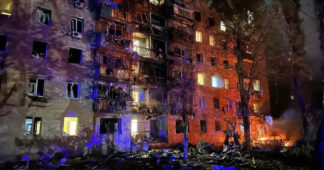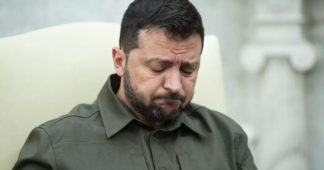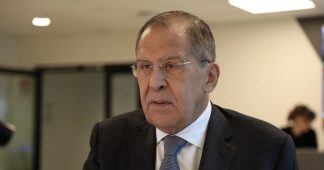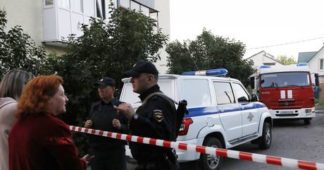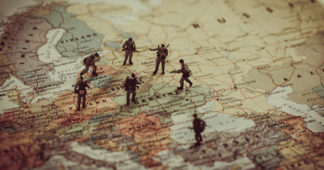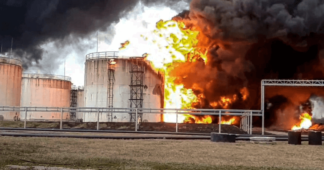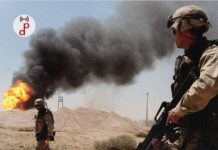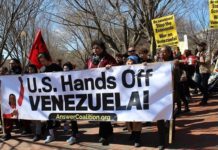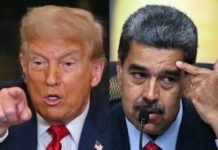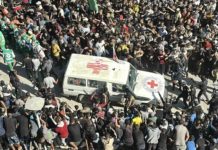By Dmitri Kovalevich *
Aug 28, 2024
The situation in late August 2024 for the Armed Forces of Ukraine (AFU) remains critical in the key war front of the Donbass region (in former eastern Ukraine). The AFU is losing several towns and villages every day to the continued advances of the Russian army. Russia is now poised to cut off the key transportation and supply city of Pokrovsk (pre-war population of 60,000), which is located 60 km north and west of Donetsk city and 140 km east of the Dnieper River in Russia’s Donetsk People’s Republic.
Ukraine military incursion into Russia’s Kursk region
Despite its worsening military situation in Donbass, Kiev decided in early August to withdraw some of its troops from there to join a military incursion into Russia’s Kursk region. Within a few days of launching it on August 6, the Ukrainian army managed to advance several dozen kilometers into the wooded and agricultural area of the Kursk region along the Ukraine-Russia border. It captured some villages and the town of Suzdha before its modest advances were halted. Suzdha is the location of a natural gas transmission station on the one, remaining gas pipeline shipping Russian natural gas through Ukraine to western Europe.
The surprise incursion undoubtedly lifted Ukrainian spirits for a few weeks and upset many Russian people and soldiers. But the celebrations for Ukraine are short-lived. Ukraine will pay dearly for its Kursk adventure with a deteriorating military situation for it in Donbass.
As Belarus President Alexander Lukashenko told a Russian television interview on August 18, “They [the Ukrainian forces in Kursk] were gathered from the frontlines elsewhere. These were mostly Ukrainian soldiers with combat experience, reinforced by mercenaries, from Poland and elsewhere. Rather powerful forces were assembled to go into Kursk,” he explained.
U.S. foreign affairs scholar Andrew Latham wrote a harsh condemnation of Ukraine’s Kursk action in the online U.S. political journal The Hill on August 18. “Ukrainian President Volodymyr Zelensky has proven himself a master of the political stage, a gifted orator capable of stirring emotions and garnering global support. However, his recent military incursion into Russia marks a departure from the realm of diplomacy and into the territory of strategic blunder. This reckless gambit, more akin to a desperate stunt worthy of a second-rate actor than a seasoned statesman, diverts critical resources from the primary battlefield while offering negligible strategic gain…”
Former Ukrainian MP Taras Chernovol writes that the Ukrainian Armed Forces re-positioned some of its most capable units from the Donbass front for the Kursk raid, while the Russian army has made no such repositioning of units. He also emphasizes that under the cover of the ‘fog of events’ in Kursk, the Russian military continues to advance on the city of Pokrovsk. He describes Ukraine’s incursion into Kursk as a case of “taking away the enemy’s territory for a few days or a few weeks while giving away your own territory forever.”
Stanislav Bunyatov, a Ukrainian military officer from the neo-Nazi battalion ‘Aidar’, writes that depleted AFU units defending Pokrovsk are outnumbered by the Russian military ten to one. According to him, the Russian forces advancing on the city do not stop even for a day, starting at four am in the morning and continuing until 9 pm in the evening.
Ukrainian political analyst Vadym Karasev is similarly puzzled why troops were shifted to Kursk when they are needed in Donetsk [Donbass region]. “On the Donetsk front, the situation is very critical, with Pokrovsk, Toretsk, and Chasov Yar all under great military pressure. If there was a calculation that Russia would withdraw reserves from there in order to transfer them urgently to Kursk, this assumption was mistaken.” Additionally, he is not sure that Kiev has enough reserves to hold the captured Kursk territories and organize the supply of its troops there.
Another former member of the Rada, the far-right, ultra-nationalist Ihor Mosiychuk, has warned in a video blog (as reported in Telegram by Politnavigator) that the loss of Pokrovsk will be costly for the Ukrainian economy, especially for the metallurgical enterprises in Donbass (which are largely owned by the oligarch Viktor Pinchuk). Metallurgy products and grain exports are the two, remaining, key pillars of the Ukrainian economy.
Mosiychuk writes, “The fall of Pokrovsk can turn into a catastrophe for our country. This is the only large mine [in Donbass] where coking coal is mined, which is essential for metallurgical production. The loss of Pokrovsk will mean the loss of its coking coal and the shutdown of ‘Metinvest’ [the large, metallurgical enterprise owned by oligarch Viktor Pinchuk].
“The second thing, which is even more terrible, is that the capture of Pokrovsk will allow Russian artillery and rocket fire to reach the railway junction of Pavlograd. This, in turn, will disrupt logistics within the Zaporozhye region and along the Dnieper River. This cannot be allowed, because it can turn into a real disaster.” [The city of Pavlograd, pre-war population of 10,000 is located 40 km west of Dnipro city, the fourth largest city in Ukraine which lies on the Dnieper River.]
Formally, the invasion of the Kursk region of Russia runs up against Ukraine law. Martial law in Ukraine only applies to its own territory. Law enforcement agencies can only act within those parameters. For them to act beyond the country’s borders requires a declaration of war. There is a de jure (‘according to law’) collision taking place, as salaries of Ukrainian police and armed forces can only be paid to those acting on the territory of Ukraine.
Pavlo Zhebrivskyy, the former head of the remaining, civil-military administration of Ukraine-controlled Donetsk oblast (province), writes about the disproportionate losses in the ranks of the AFU, which is barely hanging on in the Donbass region. “For a long time now, almost every week, I visit our soldiers in the Donetsk region. The ratio of losses of Russians to Ukrainians is about one to seven,” he writes.
Russia and its people are not intimidated
The Ukrainian military command presumably expected that its maneuver in Kursk would force Moscow to withdraw troops from Donbass and redeploy them to Kursk. But this has not happened if only because Russia has significant reserves to draw upon that are not involved in the current fighting in Ukraine or along the border.
The invasion of Russian territory has shaken Russian society, but more importantly, it has reinforced the support of the Russian people for the government’s and the country’s war aims. Many parallels are understandably being drawn in Russia to the titanic Battle of Kursk in 1943, the largest tank battle in military history in which the Soviet Red Army prevailed over Nazi German forces. The victory at Kursk was separated by only some months with the historic defeat of the Nazi German army by the Red Army at Stalingrad.
Of course, the scale of the Kursk incursion is minuscule by comparison to the events of 1943, but the symbolism of a Western-backed army, equipped with German weaponry, no less, invading Russian territory will only reinforce the Russian government’s message and the Russian peoples’ understanding that the very sovereignty of Russia is threatened by NATO’s continued, political and military intervention in Ukraine.
One result of the recent events in Kursk has been an increased flow of volunteers to Russian military recruitment centers. Russian blogger and journalist Mikhail Zvinchuk writes about the sharp increase in military volunteers taking place across Russia, even in Moscow, which has the highest standard of living in the Russian Federation. “I take my child to one of the schools in Moscow every morning and pass by a selection point for military recruits under contract. Before the Kursk events, I saw about 30-40 people every day. Not all of these are volunteers, some of them to see off friends or relatives. But equipped men are standing there, waiting, and this number has at least tripled since the beginning of the Kursk events,” writes Zvinchuk.
Demolitions of monuments to the WW2 victory over Nazi Germany
Adding to Ukraine’s troubles are the actions by Ukrainian nationalists-in-uniform that defame Russia and its Soviet history. One such defamation is the wearing of neo-Nazi insignia on their uniforms. Western military instructors have long chosen to look the other way, treating the practice as some kind of harmless game. But to the tens of millions of Russians with relatives who served in the Great Patriotic War, as World War Two is called in Russia, it’s no game and no joke. They read or hear about it every day in the media or from friends and relatives currently serving. (Vladimir Putin’s own father served in the war; he was severely wounded in 1942 but survived the war.)
Traditionally for Ukrainian and Eastern European nationalists and neo-Nazis, neo-Nazi manifestations are an extremely important part of their identification with ‘Western civilization’, as they see it. They reject Eastern Europe as a place populated by ‘inferior’ peoples.
The Ukrainian neo-Nazis also accept, in principle, a future status as ‘second-class’ Europeans, provided they are allowed to dominate over so-called ‘third-class’ people, as they consider the inhabitants of eastern Europe and Russia to be. In the Ukrainian neo-Nazi concept, the idea of equality itself is considered unacceptable because it leaves no chance for neo-Nazi adherents and their supporters to rise above others deemed to be inferior.
One of the first acts of the Ukrainian army upon entering the border town of Suzdha, Russia in August was to demolish a monument of Vladimir Lenin. This was a symbolic act of ‘revenge’ for the October Revolution which Lenin led in 1917 and for the future victories of the Soviet Red Army over Nazi Germany.
Vandalism and outright destruction of monuments to the 1917 Revolution, the Soviet Red Army, and the victories of the Red Army in the Great Patriotic War have been widespread in Ukraine proper since the far-right coup of February 2014. In Donbass in 2014, initial confrontations that quickly led to outright warfare were sparked by attacks by Ukraine’s neo-Nazi, far-right paramilitaries against monuments to war heroes. The residents of Donbass rushed to defend the monuments from being attacked or threatened.
‘Light cavalry’ favored by Russian soldiers as battlefield response to drone warfare
As drones play an increasing role in modern warfare, the effectiveness of infantry operations has become more dependent on speed. Sometimes, there are only seconds or a minute to move and maneuver before an attacking drone arrives. Younger and more energetic men fare better in such warfare because they are able to constantly maneuver and run. But the soldiers of the AFU are increasingly older, due to the mass evasions of military conscription by younger men taking place across the country. Typical recruits today are older and less able to run, jump, and otherwise maneuver on the battlefield.
The Russian side began in August to use ‘light cavalry’, as it is called (motorcycles and four-wheeled vehicles), to conduct forays against AFU positions. The vehicles allow soldiers to strike and then withdraw quickly before drones or artillery may react and strike back.
Russian Senator Dmitry Rogozin, the former head of the Russian space agency Roskosmos, writing from the front lines, writes that modern warfare is all about the speed of the attackers and their ability to maneuver. Heavy and traditionally armored vehicles are increasingly vulnerable. That is why ‘unkillable’ motorcycles and four-wheeled, all-terrain vehicles are proving very popular among Russian soldiers. Assaults using such motorized equipment are proving successful, Rogozin writes.
Incursion into Kursk to improve a future negotiating position?
The Western powers and the Kyiv regime are uttering the mantra of ‘improving Ukraine’s negotiating positions’ to justify the Kursk incursion. But the effect is exactly the opposite: the Russian leadership has announced it is abandoning any prospect of negotiations as a result. It says that the ceasefire proposals it issued in June 2024 are no longer on the table. Russia’s new stance reverts to demanding that all Ukrainian troops be withdrawn from the territories of Donetsk, Lugansk, Zaporizhzhya, and Kherson (all former oblasts of Ukraine that have voted to join the Russian Federation); that the Ukraine government accept a neutral political status in world affairs; and that it completely renounces any aspirations to join the NATO military alliance.
Ukrainian political analyst Mykhaylo Chaplyga has forecast that Russia will not end hostilities until the issue of its security is resolved, and this strongly implies the complete demilitarization of Ukraine. “They are not going to end anything until shipping and territorial disputes in the Black Sea region are resolved until former eastern Ukraine is no longer under the political and ideological control of Kiev, and demilitarization extends to the 1939 borders of Soviet Ukraine [that is, to include all of present-day western Ukraine]. Until Russia achieves this, the Russian train will not slow down,” the analyst says.
Furthermore, according to him, the Russian Federation will not hold any talks or negotiations with the outgoing U.S. administration. Future talks with a new administration in Washington must include global security issues, not only issues arising directly over Ukraine. An adviser to Zelenskyy’s office, Mykhaylo Podolyak, admitted in an interview with the British newspaper The Independent that Kiev discussed beforehand the planned attack in Kursk with its Western backers. The latter meekly claim they were not aware of what was coming.
Deteriorating financial situation of Ukraine gov’t
Some analysts explain the raid on the Kursk as the need for Ukraine to obtain new loans from Western governments and financial institutions. The country is already in default to some of those. On August 14, the international rating agency Fitch downgraded Ukraine’s credit status to “restricted default” and affirmed its other bond rating sits at ‘C’ (default imminent). The rating was downgraded because the ten-day grace period expired for payments on a US$750 million Eurobond loan. Earlier, the international rating agency Standard & Poor’s downgraded Ukraine’s long-term credit rating to SD (selective default).
Analysts at the Ukrainian Policy Institute believe that the agreement reached in late July between the Ukrainian government and some Eurobond holders on the terms of debt restructuring, as well as the law recently adopted in Ukraine allowing suspension of payments on foreign debt, mark “the beginning of a default-like process”. As a rule, rating agencies downgrade the credit ratings of states in cases of direct default as well as in cases of debt restructuring where the given state is unable to make debt payments.
Russian political analyst Malek Dudakov believes that the default of the Ukrainian economy and the AFU raid on Kursk are linked. As the Financial Times recently reported, Kiev blames the U.S. government and the European Union for long delays in disbursing loan tranches. Finance Minister Serhiy Marchenko said in a commentary for the Financial Times that slow arms deliveries, especially from the United States, led to an increase in direct military purchases by Kiev valued at US$12 billion. As a result, Ukraine has spent money on arms purchases that it would otherwise be used to pay the salaries of AFU soldiers.
“Ukraine’s budget deficit has reached a record US$44 billion equivalent. [Ukraine’s estimated GDP in 2023 was US$177 billion equivalent.] It is not for nothing that agencies have started to downgrade Ukraine’s credit rating to junk and pre-default levels. The actual partial default has already occurred,” Dudakov notes. In his opinion, the AFU incursion into the Kursk region may well be related to the desire to speed up the disbursement of tranches, as the situation with Kiev’s finances is rapidly deteriorating.
In the two and a half years of the Russian Special Military Operation, I have never seen such a flood of funeral processions and vehicles transporting dead servicemen in my home city and in neighboring towns. Sometimes public transportation sits in traffic jams to allow ambulances to pass through. No matter the day that one is in the street, you are bound to see a funeral procession. This is the price Ukrainian society is paying for the Napoleonic ambitions of its leadership and for the drive by the Western powers to somehow intimidate Russia into a subordinate status as they strive without success to maintain their imperialist hegemony.
* Dmitri Kovalevich is the special correspondent in Ukraine for Al Mayadeen English. In this report, he examines the political and military situation in
We remind our readers that publication of articles on our site does not mean that we agree with what is written. Our policy is to publish anything which we consider of interest, so as to assist our readers in forming their opinions. Sometimes we even publish articles with which we totally disagree, since we believe it is important for our readers to be informed on as wide a spectrum of views as possible.
